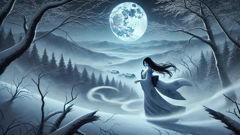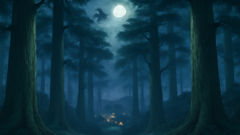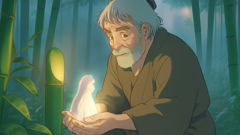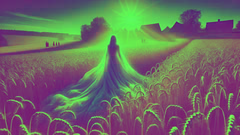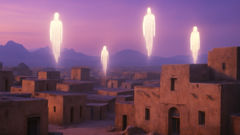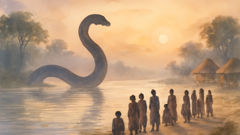Introduction
In the remote highlands of Japan, winter is not just a season—it is an all-consuming presence. The snow falls thick, blanketing the world in silence and erasing all traces of color except for the dark skeletons of trees and the curling smoke from village chimneys. Villagers pass stories from generation to generation by firelight, warning their children to fear the mountains when the wind howls and the drifts swallow even the tallest man. Among these tales, none is whispered with greater awe or trembling than that of the Yuki-onna—the Snow Woman. She is said to be more beautiful than a dream, with skin whiter than mountain ice and hair as long and dark as the winter night. Some claim to have seen her gliding over untouched snow, leaving no footprints; others swear she appears at the height of a blizzard, her presence felt in the sudden hush that falls over the world. She is both a guardian and a wraith, a figure born of the elements, embodying all the contradictions of the season she rules. For in the Yuki-onna's gaze is the promise of mercy and the certainty of peril—a chilling reminder that nature’s beauty can be as deadly as it is mesmerizing.
I. The Village Beneath the Snows
Long before roads cut through the wilderness and trains stitched the cities together, the village of Kamimura clung to the shoulder of the northern mountains, hemmed in by thick forests and gushing rivers that froze solid each winter. The villagers lived by the rhythm of the seasons, but none demanded more respect than winter. When November’s first snow arrived, doors were sealed with rice straw, and parents would gather their children by the hearth to tell them stories—cautionary tales meant to ward off the dangers lurking beyond the safety of their homes.
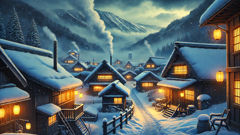
Among these stories, the legend of the Yuki-onna reigned supreme. Old Nanase, Kamimura’s matriarch, always began the tale in a whisper. “She comes when the wind carries the voices of the lost. Beware the night when snow falls so hard you can’t see your own hand. That’s when she walks.”
For centuries, villagers believed the Snow Woman was both a punishment and a protector. She was said to appear to travelers lost in a storm, sometimes offering comfort, sometimes sapping their strength with her icy breath. Farmers left rice cakes at the edge of the forest, hoping to appease her. Hunters crossed themselves and uttered prayers before venturing into the snowbound woods.
But not everyone believed the warnings. Among the villagers, a young man named Haru was famed for his daring spirit. He was broad-shouldered and quick to laugh, with a gentle heart and a restlessness that made him dream of what lay beyond Kamimura’s frozen fields. His father, once a hunter himself, had vanished in a blizzard years before, and Haru’s mother raised him alone. Despite her grief, she taught Haru to respect the old ways, to listen for danger on the wind and never stray far when the snow fell thick.
One winter evening, as a heavy snowstorm brewed and the village hunkered down for another long, cold night, Haru’s closest friend burst through the door, breathless with fear. “My father hasn’t returned from the woods!” he gasped. “He went to check the traps and—”
Haru’s mother gripped his arm. “You mustn’t go. Not tonight. The Yuki-onna walks when storms rage.”
But Haru’s sense of duty outweighed his fear. He wrapped himself in thick furs, grabbed a lantern, and promised he’d be careful. With his friend at his side, they plunged into the swirling white darkness, each step muffled by fresh snow.
As they searched, calling the lost man’s name, the blizzard closed around them. The trees loomed like specters, and every shadow seemed to move. Their voices were swallowed by the wind, and soon, even their lantern’s glow was a faint halo in the sea of white. Despair began to creep in. Haru’s friend shivered uncontrollably, his teeth chattering. “We’re lost. We should turn back.”
Just then, in a clearing dusted with powdery snow, Haru glimpsed a figure—a woman, impossibly beautiful and eerily still. Her kimono shimmered like frost, and her hair floated on the wind. She beckoned, and her eyes glimmered with something ancient and sorrowful. Haru froze, heart pounding. Was this the spirit from the stories? Or some hallucination born of fear and cold?
The woman drifted closer, her feet leaving no mark on the snow. “You seek someone,” she murmured, her voice a melody of ice and longing. “But you are far from home, and the night is cruel.”
Haru was torn between fascination and dread. “Please—help us. A man is missing. We only want to find him and return.”
Her lips curved in a sad smile. “All those who linger in these mountains are claimed by winter. I can lead you to him, but you must promise never to speak of me—not to anyone.”
Desperation eclipsed fear. Haru nodded, and his friend echoed the vow. The Snow Woman turned, gliding through the forest. They followed her through twisting paths and silent glades where the snow fell thickest. At last, in a hollow beneath a pine, they found the missing man—alive but barely conscious, covered in a thin layer of frost. With the woman’s guidance, they carried him home, emerging from the forest just as the first rays of dawn broke through the storm clouds.
Exhausted and shaken, Haru remembered his promise. Yet the memory of the Snow Woman haunted his dreams: her ethereal beauty, her lonely eyes, and the way the cold seemed to cling to him long after the snow had melted.
II. The Snow Woman’s Bargain
The winter passed, and life in Kamimura returned to its slow rhythm, but Haru was restless. He remembered every detail of that night: the Yuki-onna’s voice, her tragic grace, and the cold that had settled deep within his bones. He tried to speak with his friend about it, but was met with silence and fearful glances. The villagers sensed something had changed in Haru—a quiet, almost mournful quality behind his smiles.
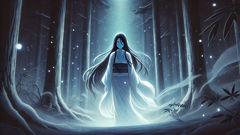
Spring brought renewal, but also a lingering chill. Some evenings, Haru wandered to the edge of the forest, where old snow still clung to shaded hollows. There, among silent trees and half-melted drifts, he felt her presence—a gentle shiver in the air, a shadow gliding across the moonlit snow.
One night, unable to resist the pull any longer, Haru ventured into the woods alone. The moon hung low and bright, casting blue shadows across the earth. He called softly, “Yuki-onna… Snow Woman… if you’re real, let me see you.”
At first, there was only silence, broken by the distant call of an owl. Then, from the heart of the forest, she appeared—her kimono billowing like mist, her hair streaming behind her as if woven from midnight itself. Her beauty was almost unbearable; her presence, both inviting and forbidding.
“You called,” she said softly, her breath visible in the cold night air.
Haru bowed, unsure whether to address her as a spirit or a woman. “I wanted to thank you. You saved our lives.”
Her eyes searched his face. “Many fear me. Why are you not afraid?”
He hesitated. “I was. But now… I don’t know. I think I understand you’re lonely.”
The Snow Woman looked away, a wistful sadness in her gaze. “I am bound to these mountains. I am winter’s daughter—neither alive nor dead. I bring mercy or death as the winds decide. But once, long ago, I was a woman who loved and lost.”
Haru listened as she told her story. She’d been born in a distant village centuries before—a humble girl who fell in love with a woodcutter. When he vanished in a blizzard, she braved the storm to find him. Instead, she was claimed by the spirit of the mountain and transformed into the Yuki-onna, tasked with guarding the snows and guiding lost souls.
“You must leave,” she warned. “My touch is death. If you return, you may not survive.”
But Haru was captivated. “Let me see you again. I won’t tell anyone. I promise.”
The Snow Woman’s gaze softened. “Return here when the first snow falls again. If your heart remains unchanged, I will grant you a wish.”
Haru agreed, though he could not know what longing and sorrow awaited him. Through the changing seasons, he waited—haunted by dreams of her and the memory of her cold, beautiful eyes. When winter returned, he found himself once again at the edge of the woods, snow swirling around him, and called her name.
She appeared, even more ethereal than before. “Why have you come back?” she asked.
“I wish for you to be free—from loneliness, from sorrow, from this mountain,” Haru said.
The Snow Woman’s expression was unreadable. “Freedom comes at a price.”
She reached out and touched his cheek, her hand icy but gentle. In that instant, Haru saw visions: centuries of winter nights, lost travelers, broken promises, and all the cold beauty she carried. He felt her longing—for warmth, for connection, for release from her endless cycle.
Moved by her pain, Haru made a vow. “If I can’t free you, then let me share your loneliness. I will keep your secret and return to you each winter, as long as I live.”
A single tear—clear and cold as diamond—fell from the Yuki-onna’s eye. She nodded, and for a moment, the wind seemed to soften. From then on, Haru would vanish each winter’s night, returning at dawn with frost in his hair and a faraway look in his eyes. The villagers whispered that he was cursed, but Haru never revealed the truth.
Instead, he cherished the bittersweet comfort of his promise, and the haunting beauty of the Snow Woman who waited for him in the heart of winter.
III. Mercy and Memory: The Price of Winter’s Love
Years passed, and the legend of the Yuki-onna grew with each retelling in Kamimura. Haru became a man both admired and pitied—known for his courage and for the quiet melancholy that shadowed his steps. Each winter, as snow buried the village in silence, he would disappear into the mountains. Some believed he sought fortune or adventure; others suspected he communed with spirits.
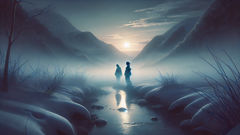
One especially harsh winter, famine gripped Kamimura. The villagers’ stores dwindled, and children fell ill. Haru’s mother grew frail. He watched helplessly as hope faded from their faces. In desperation, he climbed into the mountains, calling for the Snow Woman.
She appeared among wind-sculpted drifts, her form more spectral than ever. “Why have you summoned me?” she asked.
Haru bowed low. “My people are suffering. If you ever felt kindness for me, show mercy to my village.”
The Yuki-onna hesitated. “My nature is cold and unyielding. But your loyalty has warmed me.” She gestured to the sky, and for three days, the blizzards ceased. The sun returned, melting enough snow for villagers to gather firewood and hunt. The brief thaw saved many lives.
But such gifts came at a cost. As the snow melted, so too did the boundary between the worlds of spirit and flesh. The Yuki-onna’s power began to wane. She grew paler, more transparent, her sadness deepening. Haru saw her less often, her visits brief and haunted by silence.
One evening, as the moon hung heavy over the white peaks, Haru found her waiting by a frozen stream. “You’re fading,” he whispered in anguish.
She nodded. “Every act of mercy draws me further from this world. Soon, I will be nothing but wind and memory.”
Tears sprang to Haru’s eyes. “Then let me go with you—into whatever world you belong.”
The Snow Woman shook her head. “You are mortal. Your place is here. But remember me. Tell my story—not as a warning, but as proof that even winter can show kindness.”
As dawn broke, she vanished into the morning mist. Haru returned to Kamimura changed—his hair silvered by frost, his eyes filled with sorrow and wonder. He shared what he could of her story with those who would listen: how beauty and danger were one, how mercy could be found in even the harshest season.
The villagers came to see winter differently—not only as a time of hardship, but as a season rich with mystery and grace. Rice cakes left at the forest’s edge were not just offerings of fear, but tokens of gratitude. Parents told their children not only to beware the Yuki-onna, but to honor her for her lonely kindness.
Haru grew old in Kamimura. In his final winter, as snow blanketed the village for the last time in his life, he was seen walking into the mountains beneath a pale dawn. Some say he vanished without a trace. Others claimed that in the first rays of sun, two figures could be glimpsed—one mortal, one made of snow and longing—walking side by side through fields of untouched white.
The legend endured, weaving itself into the soul of Kamimura and into the hearts of all who listened by winter fires: that in the coldest season, there is always the hope of warmth; that behind every harsh wind and blinding drift, there may wait a spirit whose beauty is matched only by her sorrow.
Conclusion
The legend of the Yuki-onna lingers like a breath of cold air—haunting yet beautiful, echoing across generations in Kamimura and far beyond. Though her story began as a warning—a spectral presence stalking snowstorms, claiming travelers with her icy touch—it transformed through Haru’s courage and compassion. Where there was once only fear, there grew understanding: that winter is not solely a force to dread, but a mystery to be respected and even cherished. The villagers learned that beneath nature’s harshest face lay moments of mercy, fleeting warmth, and lessons about sacrifice and longing. To this day, when snow falls thick and moonlight glimmers on drifts, children in mountain villages listen for the whisper of silk on snow and wonder if the Snow Woman still wanders among them—watchful, lonely, and perhaps waiting for another kind soul brave enough to seek her out in the silence. Thus, the Yuki-onna’s tale endures: a delicate balance of love and loss, beauty and peril, teaching all who hear it that even in the coldest season, there is always room for hope and kindness.

